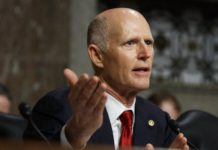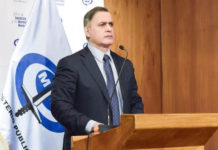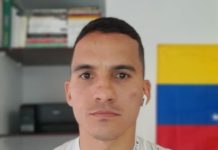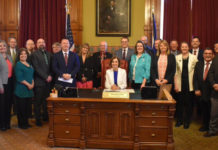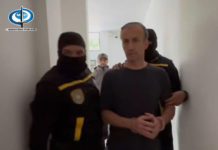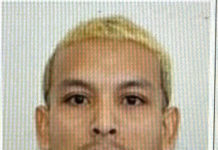
By Luke DeCock – staff columnist
[email protected]
The sense of helplessness was overwhelming. Tripp Tracy’s younger brother had been arrested and imprisoned in Venezuela, accused of espionage. The Carolina Hurricanes television analyst and his family were scrambling to figure out what to do next.
Grasping at any thread of hope, Tracy mined his hockey connections. It was only through a quirk of the schedule the Hurricanes flew to Pittsburgh the next day for the final game of the 2012-13 season. There, he saw his old college teammate, Penguins forward Craig Adams, whose father-in-law was the one man Tracy thought might be able to help: Paul Cellucci, the former governor of Massachusetts and U.S. ambassador to Canada.
Cellucci would have the back-channel access to lay a path for Tim’s release. He was also in the final, fatal stages of ALS, Lou Gehrig’s Disease. Cellucci could only communicate through staccato emails, painstakingly dictated through a computer program or with the help of his wife, but his mind was as sharp as ever even as his body withered.
“Everyone was trying to do anything they could,” said Emmet Tracy, Tripp and Tim’s father. “Tripp seized upon this relationship with Paul. I thought at the time, let him do it, it takes up his energy, lets him feel like he’s doing something. I didn’t see anything coming out of this. I knew how sick Paul was.”
Cellucci’s role in this story – a hockey spy novel, John le Carre meets John LeClair – has never been told. A lengthy article in Playboy about Tim Tracy’s ordeal in Venezuela never mentions Cellucci’s name, nor has any of the news coverage. But from his wheelchair, the lifelong public servant who never lost an election tried to orchestrate a set of diplomatic maneuvers, both official and unofficial, to set Tim Tracy free.
A documentary trip gone awry
Tim Tracy, 35, was a neophyte documentary filmmaker who was working on a film about the Venezuelan opposition both before and after the death of the dictator Hugo Chavez in March. He had been arrested twice and released before. This time, he was arrested at the Caracas airport on April 24 while trying to fly home for his father’s 80th birthday and faced 30 years in prison, accused of fomenting revolution.
Under Chavez, relations between the United States and the Chavez government were frayed at best, hostile at worst. Tracy was arrested at the airport at the behest of Chavez’s replacement, Nicolas Maduro, who had won a controversial election and been in power for all of five days.
Tripp Tracy was the first to call the U.S. Embassy there and ask if his brother was safe. “We don’t know” was the answer. The team flew to Pittsburgh, where Adams and Tracy had dinner.
Tracy played hockey at Harvard with Adams, who would later be drafted by, and win the Stanley Cup with, the Hurricanes. Adams’ wedding to Anne Cellucci in Ottawa in 2003 took on royal appeal north of the border, an NHL player marrying the American ambassador’s daughter.
Tracy knew Paul Cellucci well, having been invited by Adams to spend Thanksgiving with Anne’s family at the Massachusetts State House in Boston while Cellucci was governor. Now, Cellucci used a wheelchair at the family home in the small central Massachusetts town of Hudson, but in Tripp’s mind, he was Tim’s only hope.
“When they were in town, Tripp and I spoke face-to-face and talked about, ‘Where do you start? Where do you try and start to come up with a solution?’” Adams said. “Right away, we asked Paul for his advice. Tripp and Paul had known each other for a long time and go way back. Pretty soon it was just the two of them going back and forth.”
Cellucci’s initial emails laid out the path for the Tracy family. They had been calling senators in Florida and Michigan, but he put them in touch with the correct legislator to push the case with the State Department and Rep. Adam Schiff, D-Calif., Tim’s congressman. He touched base with Secretary of State John Kerry, an old political rival and colleague from Massachusetts.
While the State Department pursued Tim’s release through standard diplomatic means, an exceedingly difficult task because of the state of relations with Venezuela, Cellucci went to work behind the scenes. A lifelong Republican, he reached out to two retired Democratic legislators from Massachusetts with connections to Venezuela: Joe Kennedy and Bill Delahunt. Kennedy deferred to Delahunt, Cape Cod’s longtime congressman, who had represented the United States at Chavez’s funeral.
Delahunt had known Maduro for a decade and had recently intervened to help secure the release of a ship the Venezuelan government had seized.
“Paul somehow became aware of that,” Delahunt said. “Paul was an old and dear friend, and while we were from different parties, we were close. I had a lot of respect for him, and it was mutual. Whenever I had a hearing on Canada, I would always give him a call. I was fully aware of what he was going through. The conversation was, ‘Hey, can you help me with this?’ And my natural reaction was, ‘Oh, God.’ But you can’t say no to Paul Cellucci. I couldn’t, anyway.”
Intrigue and diplomacy
Over the next few weeks, while Tim Tracy remained imprisoned, Delahunt mined his contacts. His breakthrough came at a reception at the Venezuelan Embassy in Washington, when he was able to speak directly with Calixto Ortega, Venezuela’s top diplomat in the United States. Ortega made it clear that his foreign minister, Elias Jose Jaua, would very much like to speak with Kerry at a meeting of the Organization of American States in Guatemala in June.
For the first time, Delahunt saw an opening. He spent three hours with Kerry’s chief of staff trying to make Tracy’s release a condition of any meeting between Kerry and Jaua. On May 26, he called Emmet Tracy with an update, waking him up on a Sunday morning. At that point, Tim Tracy had been imprisoned for 32 days.
“There is a situation that might be an opportunity for Timmy to get out,” Delahunt told Emmet Tracy. “If this doesn’t happen, I am very worried that it isn’t going to happen for a long time.”
That ominous warning was echoed three days later when Tim Tracy was moved from the headquarters of the Venezuelan secret police, where he could communicate with his family, to the country’s most notorious prison, a decrepit, corrupt, circle of hell called El Rodeo. All contact with Tim was cut off for almost a week.
On June 3, diplomatic services around the world buzzed with news that Kerry had agreed to meet with Jaua in Guatemala. That same day, Tim Tracy was taken out of El Rodeo and returned to the secret-police headquarters.
Two days later, Venezuela put Tracy – 30 pounds lighter and carrying only a shopping bag – on a flight to Miami. The state television station chronicled his departure through the airport until the moment the plane left the ground. Hours later, across the Caribbean in Antigua, Guatemala, a grinning Jaua was photographed shaking Kerry’s hand, the first Cabinet-level diplomacy between the two countries in more than three years.
“I’m sure the U.S. will never say it, but I firmly believe it was a condition of the bilateral (talks),” Tripp Tracy said. “You just look at the full chain of events. Paul Cellucci, to me, is a hero. I know that he’s a hero in my family. My mom and dad completely believe that he saved my brother’s life.”
Cellucci lived just long enough to see his efforts succeed. Argeo Paul Cellucci passed away in Hudson three days after Tim Tracy landed in Miami. He was 65.
In his statement lamenting Cellucci’s death, Kerry referred obliquely to the Tracy case: “He called the State Department to advocate on behalf of a Massachusetts family just a couple months ago, something that was quintessential Paul Cellucci.”
Tim Tracy never met him, but even amid the swirl of emotions that accompanied his release, the news of Cellucci’s death hit him like a punch to the stomach.
“I’ll never know exactly how much of an impact he had, but I have to think that it was really, really critical at a time when my family was worried and didn’t exactly know what to do,” Tim Tracy said. “He really put in motion the steps that perhaps made the difference between me being here and still being there. I’ll never forget what he did. For a stranger.”
A memorial service for Cellucci was held later that week at the State House. Adams and his wife were among those who followed the flag-draped casket up the Capitol steps, as state troopers stood at attention. A long list of speakers saluted Cellucci as political rivals sat next to one another, Michael Dukakis (former Massachusetts governor and 1988 Democratic presidential candidate) alongside Mitt Romney (2012 Republican presidential candidate). William Weld, who preceded Cellucci as governor, held up a Weld-Cellucci campaign T-shirt that read, “Some of our best friends are Democrats.”
Tripp Tracy flew to Boston to be in the audience that day, one of only a few people among the thousands gathered who understood the true significance of the last act of a dying man.


